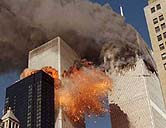
FRIDAY, Jan. 7 (HealthDay News) — The first study to focus solely on the risk for post-traumatic stress disorder among those who survived the Sept. 11, 2001 attacks on the World Trade Center finds many afflicted by the disorder years after.
In fact, of the 3,271 evacuees of the Twin Towers surveyed in the study, nearly all (96 percent) said they suffered from at least one current post-traumatic stress symptom, while 15 percent tested positive for PTSD two to three years after the attacks.
The findings, from Columbia University’s Mailman School of Public Health, the New York City Department of Health and Mental Hygiene, and the federal Agency for Toxic Substances and Disease Registry, appear in the current online edition of the American Journal of Epidemiology.
Post-traumatic stress disorder — triggered by experiencing an event that causes intense fear, helplessness or horror — can include flashbacks, emotional numbing, overwhelming guilt and shame, being easily startled, and difficulty maintaining close relationships.
Certain factors seemed to raise the odds of post-traumatic symptoms, the study found. Strongest among them was a relatively late start to evacuation. Being on a higher floor of the buildings, personally witnessing a horrific event, sustaining an injury, and being caught in the dust cloud created by the towers’ collapse were also predictors of PTSD, the researchers found.
The odds of PTSD also rose if a person worked for a company that lost employees in the disaster, the study found.
“PTSD risk was greater among survivors who experienced serious life threat as defined by location in the towers, time of evacuation initiation, or dust cloud exposures,” Dr. Laura DiGrande, Columbia’s Mailman School of Public Health doctoral degree recipient for this research and first author of the study, said in a Columbia news release. “As one would expect, individuals who were exposed to several of the most troubling and life-threatening events during the disaster were at the greatest risk of PTSD.”
Most (91 percent) of people caught above the impact zone in 2 World Trade Center said they had already begun evacuating the building after the first plane hit 1 World Trade Center. About 61 percent said they were caught in the resultant dust cloud after the collapse, 94 percent witnessed horror, and about a third (32 percent) sustained an injury — anything from a concussion to a strain or sprain, according to the report. Most (about 96 percent) said the World Trade Center was their usual place of work.
Certain demographic factors seemed to raise survivors’ chances for PTSD — lower-income individuals were at higher risk than more affluent survivors, and blacks and Hispanics faced higher odds for PTSD than did whites.
And while the study looked at survivors’ mental health two to three years after the disaster, the impact of the 9/11 attacks may well last even longer.
“As the long-term effects of the WTC disaster emerge, the results from this study suggest that some survivors of the WTC disaster will continue to report psychological symptoms years after their exposure to the events of 9/11,” study senior author Dr. Sandro Galea, chair of the department of epidemiology at Columbia’s Mailman School of Public Health, said in the news release.
More information
The National Center for PTSD has more on this condition.

